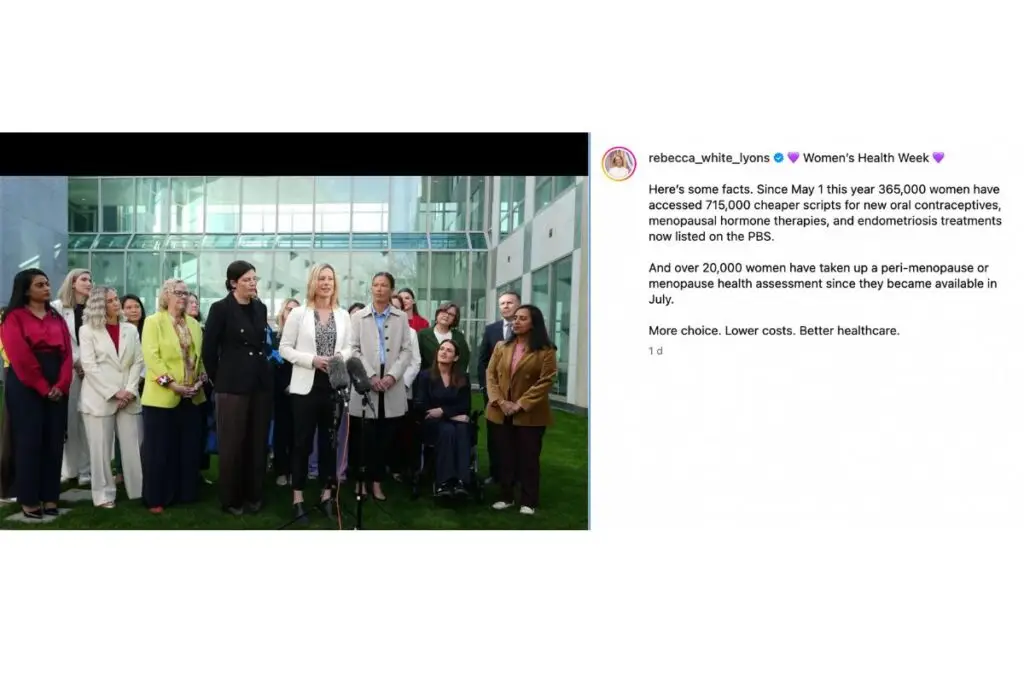Written by Assistant Minister for Health and Aged Care, Rebecca White MP
For too long, women’s health has been sidelined, stigmatised, and in many cases, simply ignored leaving countless women without the care, choice, or respect they deserve.
Throughout our lives the health system has too often told us to “put up with it” because what we are experiencing is common for women our age or stage in life.
I’ve experienced it firsthand, and I’ve heard it time and again from those around me.
I’ve seen friends and members of my community trying to get answers, pay unnecessary costs, or be dismissed when they described their pain.
These experiences can leave you feeling defeated or confused – not knowing where to place your trust and what to do next. These experiences stay with you.
But it is also from these experiences that we can harness motivation to change the system so that it works to support women access the health care needed.

There have been some huge improvements made to ensure that when women seek out help they are listened to, have their concerns taken seriously and can access the diagnosis and treatment they need.
Before the last federal election the Albanese Labor Government launched the Women’s Health Package with an investment of $792.9 million that is already delivering more choice, lower costs, and better care for women.
For years, contraception has come with a heavy price tag, and let’s be honest, women have carried that cost, month after month.
But now that’s finally changing.
Since announcing our Women’s Health Package earlier this year, more than 365,000 women have filled over 715,000 cheaper scripts for new oral contraceptives, menopausal hormone therapies and endometriosis treatment listed on the PBS.
Before Yaz®, Yasmin® and Slinda® were listed on the PBS, women were paying close to $380 per year for their pill. Now? They are paying less than half that, $126.40, or just $30.80 a year with a concession card.
And it’s not just the pill. Long-term options like IUDs and birth control implants will soon be more affordable too.
That’s money back in women’s pockets. And more options within their price range.
Women experiencing menopause and perimenopause are also being supported like never before.
We are funding health professionals to undertake additional training in menopause and perimenopause, and we will deliver Australia’s first clinical guidelines and a national awareness campaign to raise awareness of the treatment options women can access for their symptoms.
Since 1 July, more than 20,000 women have already undergone a menopause or perimenopause health assessment covered by Medicare.
On top of that, we’ve added the first new hormone therapies in over two decades to the PBS. Estrogel®, Prometrium® and Estrogel Pro®.
Previously women might have paid up to $670 a year, now they are only paying $31.60 per script or $7.70 if they are a concessional patient.
Specialist care is expanding too. 11 new endometriosis and pelvic pain clinics are opening, and we are resourcing all 33 clinics to also support women through menopause. These are places where women are listened to, believed, and cared for.
Through national pharmacy trials, women will be able to access contraceptives and treatment for uncomplicated UTIs directly from a pharmacist, with concession cardholders able to do so at no cost. That means faster, easier, more affordable care for around 250,000 women.
These changes are real. They are happening now. And they are the result of years of women speaking out and demanding better. We listened, and we have acted.
For me, these changes are about changing the experiences of women in Australia and helping to build a system that respects women’s health at every stage of life.
I know that the journey is not the same for every woman, but this is a turning point, and we can only go forward and build from here.
This Women’s Health Week 2025, I want every girl and woman in Australia to know that you don’t have to navigate your health care alone. There are a range of services and supports that have been designed for you by other women and I encourage you to use them. Because when we support one another, we all do better.
Top photo – Pictured: Assistant Minister for Health and Aged Care, Rebecca White MP, Source: Supplied

